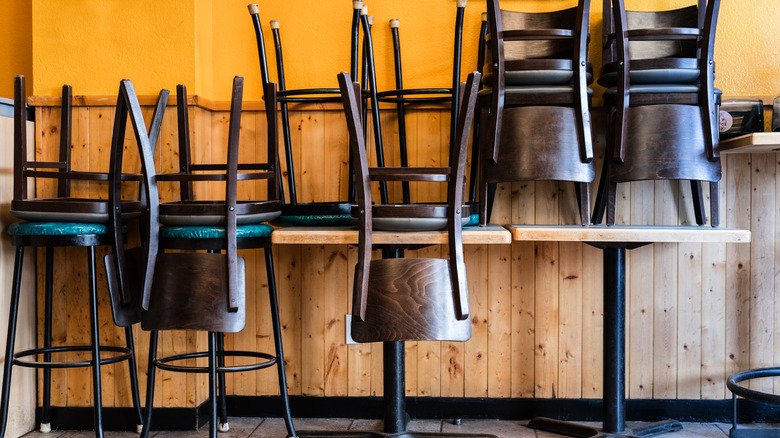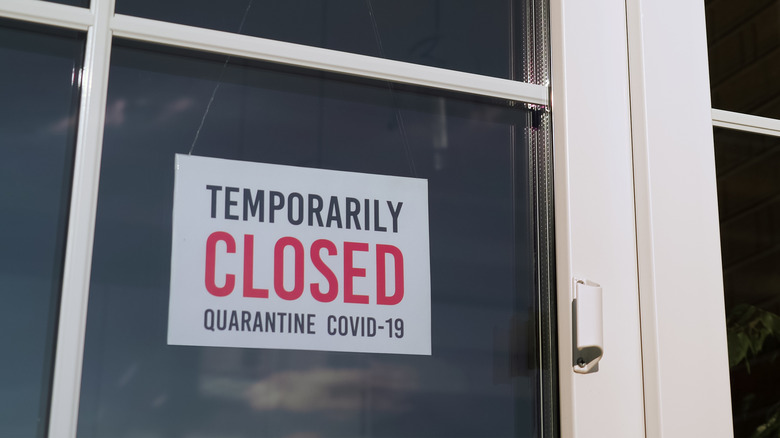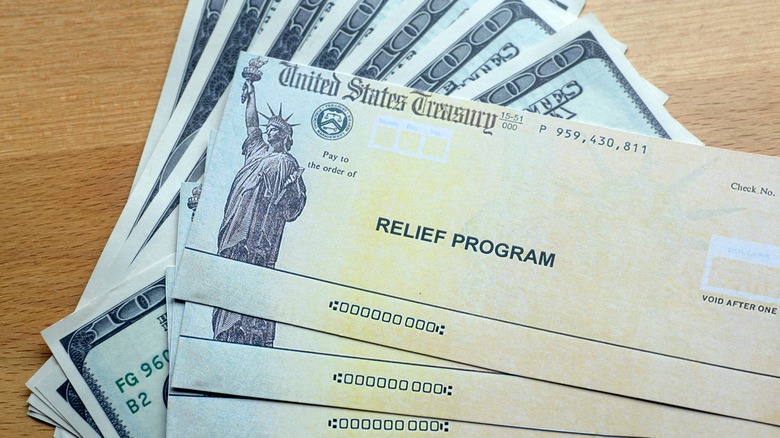What The Senate's Revitalization Fund Decision Really Means For Restaurants
It may have taken months of lobbying on the part of the restaurant industry to push the bill forward, but the end came quickly for the Small Business COVID Relief Act of 2022. It was a bill that was meant to inject an additional $40 billion into an existing lifeline for small restaurant owners across the country, and who are still struggling with the aftermath of COVID-19, per Eater. The act was bipartisan; it was co-sponsored by Republican Senator Roger Wicker and Democrat Ben Cardin. But the vote fell almost along partisan lines. A motion to move it to the Senate floor did not get the required number of votes to pass the filibuster — and the bill failed 52 to 43.
To say that restaurant industry lobby groups were dismayed by the outcome is most certainly an understatement. Before the vote, the Independent Restaurant Coalition's Erika Polmar was already painting a grim scenario of the small restaurant business, saying, per Eater, that: "Neighborhood restaurants nationwide have held out hope for this program, selling their homes, cashing out retirement funds, or taking personal loans in an effort to keep their employees working and their doors open."
National Restaurant Association president Michelle Korsmo had further warned that the failure of the legislation to pass would "result in more economic hardships for the families and communities across the country that rely on the restaurant industry."
Small restaurants have been suffering since 2020
When a U.S. infection of the 2019 novel coronavirus was first revealed on January 21, 2020, few of us had an inkling of what was to come. By February 3 that year, the U.S. had declared a public health emergency, and a month later, former President Donald Trump declared COVID-19 a national emergency. On March 19, California issued a statewide stay-at-home order, per AJMC.
The restaurant industry paid a high price for the pandemic. Fears of the deadly virus and stay-at-home orders across the country led what Fortune estimates to be about 90,000 restaurants to close. It cost nearly 6 million people their jobs. In 2020, the industry recorded a head-turning $200 billion drop in sales.
Aid was supposed to come in the form of the $349 billion meant to be disbursed under the Paycheck Protection Program (PPP). But while it was set up to help small businesses with less than 500 employees per NPR, companies operating under a franchise model like Shake Shack applied for — and got loans upwards of $10 million from the Small Business Administration. Ruth's Chris Steakhouse, which received $20 million under the PPP, returned the money along with Shake Shack after facing backlash. Banks ended up taking a whopping $10 billion in fees, and the first round of funding ran out just 13 days after it opened.
The original Restaurant Revitalization Fund wasn't large enough
According to The National Restaurant Association, when the Biden Administration took office in January of 2021, the Restaurant Revitalization Fund, established with the American Rescue Plan Act, was set in motion. It was lilliputian compared to the PPP, offering just $28.6 billion in federal grants through the Small Business Administration. Yet, it was just what the industry ordered.
Per Forbes Advisor, the fund offered $10 million per business and no more than $5 million in aid per physical space. Grants were not taxable, and recipients would not have to pay back the cash. The funds were meant to cover payroll, mortgage and rent, debt service, utilities, and expenses related to suppliers. The grant was open to food and beverage outlets. It included restaurants, food stands, and caterers, was not allowed to be publicly traded, and was limited to those with 20 or fewer locations. The grants were meant to be reviewed on a first-come, first-served basis.
Restaurants with no help face a grim future
It might have been just what the chef had ordered, but there wasn't enough to go around. According to Restaurant Business, 105,000 restaurants qualified, 105,000 restaurants managed to qualify for aid before the fund dried up, leaving 177,000 applications in limbo after the program depleted. But now that the Restaurant Revitalization Fund has failed to pass, the future of America's independent restaurants looks grim. The Independent Restaurant Coalition tells CBS that over half of the restaurants hoping for the lifeline are expected to close in six months. The Coalition paints an image of loan defaults, bankruptcies, and evictions.
To restaurant owners and chefs like Greg Leon, who owns and operates Amilinda in Milwaukee, the issue was cut and dried — or at least it should have been. "I think about the thousands and thousands of restaurant owners around this country, both Democratic and Republican. Because this isn't just a blue thing — this is a blue and a red thing," Leon tells Restaurant Dive.
He adds: "I can't understand why our elected officials would not want to do something to help their constituents. It just boggles my mind."



